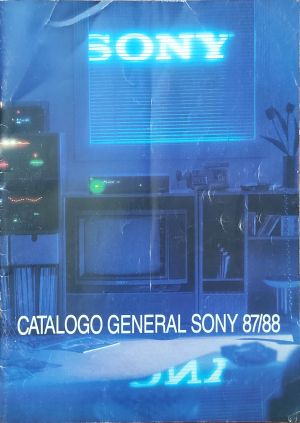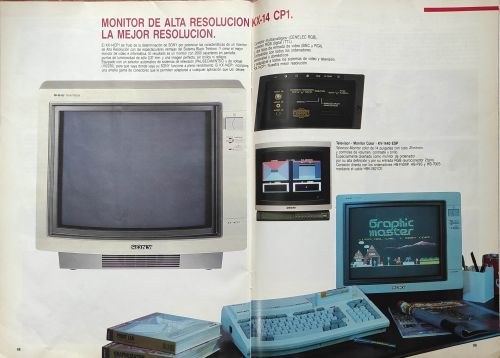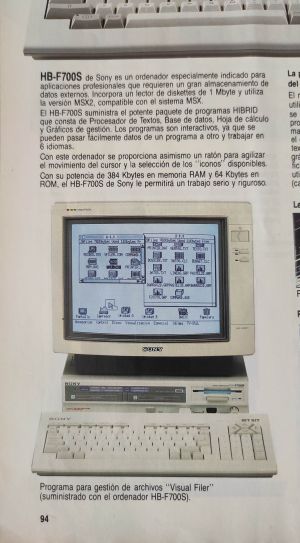CRT:KX-14CP1: Difference between revisions
m (uploaded some photos of the brochure and other small edits) |
Slim Dread (talk | contribs) m (adde tube series) |
||
| (3 intermediate revisions by 2 users not shown) | |||
| Line 4: | Line 4: | ||
|manufacturer = Sony | |manufacturer = Sony | ||
|type = Professional | |type = Professional | ||
|tube_series = Trinitron | |||
|size = 14" | |size = 14" | ||
|dimensions = | |dimensions = | ||
| Line 11: | Line 12: | ||
|weight = 12.8 Kg, 28 lb, 5 oz | |weight = 12.8 Kg, 28 lb, 5 oz | ||
|tvl = 450 | |tvl = 450 | ||
|dot_pitch = | |dot_pitch = 0.37 mm | ||
|firmware = | |firmware = | ||
|earliest = | |earliest = | ||
| Line 29: | Line 30: | ||
|operation_manual = | |operation_manual = | ||
|service_manual = [[File:KX14CP1_SM_SONY.pdf|Service Manual]] | |service_manual = [[File:KX14CP1_SM_SONY.pdf|Service Manual]] | ||
|brochure = | |brochure = | ||
}} | }} | ||
| Line 38: | Line 38: | ||
1- the Sony KX-14CP1 had one mono audio input, 2 composite inputs (one BNC and one standard RCA, not usable simultaniously) a VTR port with digital RGB support and a SCART connector with full support for RGB and audio | 1- the Sony KX-14CP1 had one mono audio input, 2 composite inputs (one BNC and one standard RCA, not usable simultaniously) a VTR port with digital RGB support and a SCART connector with full support for RGB and audio | ||
2- the Sony PVM-1390 shared most of the inputs from the 14CP1, here both composite inputs | 2- the Sony PVM-1390 shared most of the inputs from the 14CP1, here both composite inputs have a BNC type connector and the SCART port is replaced by a 25-pin CMPTR port, which carries the same signals. The VTR port with digital RGB support is also present. | ||
3- the Sony KV-1311CR was instead a | 3- the Sony KV-1311CR was instead a more consumer oriented version of this monitor, it shared the same inputs as the PVM-1390 with the addition of an RF tuner. This version has some peculiarities, like the presence of an extra set of buttons on the front-right side to control channel selection and volume and a set of buttons to memorize or delete selected channels. | ||
The TV came with it's own remote and an IR sensor is located on the front-right side. | |||
For this purpose the tube is positioned so that it's tilted upwards when the monitor sits on a table, to give a comfortable experience if used as a computer monitor on a desk. | Sony advertised the KX-14CP1 as a computer monitor, to be paired with Sony's MSX microcomputers of the time. | ||
For this purpose, the tube is positioned so that it's tilted upwards when the monitor sits flat on a table, to give a comfortable experience if used as a computer monitor on a desk. | |||
A pair of detachable riser feet were included to prop the back side up so the tube could be made perpendicular to the surface, but it's rare to find them alonside the monitor. | |||
The tube has a black tint to improve colors and contrast and boosts 450 TVL which is reasonably sharp at 14 inches (13 viewable). | The tube has a black tint to improve colors and contrast and boosts 450 TVL which is reasonably sharp at 14 inches (13 viewable). | ||
A peculiar feature of this set is the positioning of the inputs and knobs: they are located on a recessed panel on the right side | A peculiar feature of this set is the positioning of the inputs and knobs: they are located on a recessed panel on the right side of the case, so that the back remains clear and can sit right up to a wall (in a standard desktop setup). | ||
The side panel gives you access to all the regulation knobs, which include | The side panel gives you access to all the regulation knobs, which include some standard ones (brightness, contrast, volume, etc) and two unusual ones: horizontal positioning and vertical size knobs, very handy if you connect a retro-computer to it, but very much appreciated to correct the infamous SCART input shift on the fly. | ||
A decent mono speaker is positioned on the bottom center of the assembly, it offers | A decent mono speaker is positioned on the bottom center of the assembly, it offers decent quality mono audio (nothing to do with the mono speaker built in later PVMs, which was only there for testing purpuses). | ||
Awesome brochure photos from [https://www.reddit.com/user/falsogangster u/falsogangster] ! | Awesome brochure photos from [https://www.reddit.com/user/falsogangster u/falsogangster] ! | ||
Latest revision as of 15:36, 15 July 2024
| Information | ||
|---|---|---|
| Manufacturer | Sony | |
| Type | Professional | |
| Tube Series | Trinitron | |
| Size | 14" | |
| TV Lines | 450 | |
| Dot Pitch | 0.37 mm | |
| Regions | Pal, NTSC 4.43/3.58, SECAM | |
| 240p/480i | Yes | |
| 480p | No | |
| 720p | No | |
| 1080i | No | |
| Vsync | 50/60hz | |
| Composite | Yes | |
| S-Video | No | |
| Component | 1x RGB through SCART or 25-pin CMPTR port | |
| Dimensions | Width: 385mm, 15 1/16 inches
Depth: 434mm, 17 1/8 inches Height: 342mm, 13 1/2 inches | |
| Weight | 12.8 Kg, 28 lb, 5 oz | |
| Links | ||
| Service Manual | File:KX14CP1 SM SONY.pdf | |
The Sony KX-14CP1 is a versatile monitor from 1986. Its uses included the medical field, the video production field and even home use. Input options varied between the 3 major revision of this monitor:
1- the Sony KX-14CP1 had one mono audio input, 2 composite inputs (one BNC and one standard RCA, not usable simultaniously) a VTR port with digital RGB support and a SCART connector with full support for RGB and audio
2- the Sony PVM-1390 shared most of the inputs from the 14CP1, here both composite inputs have a BNC type connector and the SCART port is replaced by a 25-pin CMPTR port, which carries the same signals. The VTR port with digital RGB support is also present.
3- the Sony KV-1311CR was instead a more consumer oriented version of this monitor, it shared the same inputs as the PVM-1390 with the addition of an RF tuner. This version has some peculiarities, like the presence of an extra set of buttons on the front-right side to control channel selection and volume and a set of buttons to memorize or delete selected channels.
The TV came with it's own remote and an IR sensor is located on the front-right side.
Sony advertised the KX-14CP1 as a computer monitor, to be paired with Sony's MSX microcomputers of the time.
For this purpose, the tube is positioned so that it's tilted upwards when the monitor sits flat on a table, to give a comfortable experience if used as a computer monitor on a desk. A pair of detachable riser feet were included to prop the back side up so the tube could be made perpendicular to the surface, but it's rare to find them alonside the monitor.
The tube has a black tint to improve colors and contrast and boosts 450 TVL which is reasonably sharp at 14 inches (13 viewable).
A peculiar feature of this set is the positioning of the inputs and knobs: they are located on a recessed panel on the right side of the case, so that the back remains clear and can sit right up to a wall (in a standard desktop setup).
The side panel gives you access to all the regulation knobs, which include some standard ones (brightness, contrast, volume, etc) and two unusual ones: horizontal positioning and vertical size knobs, very handy if you connect a retro-computer to it, but very much appreciated to correct the infamous SCART input shift on the fly.
A decent mono speaker is positioned on the bottom center of the assembly, it offers decent quality mono audio (nothing to do with the mono speaker built in later PVMs, which was only there for testing purpuses).
Awesome brochure photos from u/falsogangster !
Links
https://aperturegrille.fandom.com/wiki/SONY_KX-14CP1
Reddit Links
https://www.reddit.com/r/crtgaming/comments/v5g1lk/new_find_sony_kx14cp1/
https://www.reddit.com/r/crtgaming/comments/vauuzj/last_big_score_3_x_sony_kx14cp1_black_trinitron/


